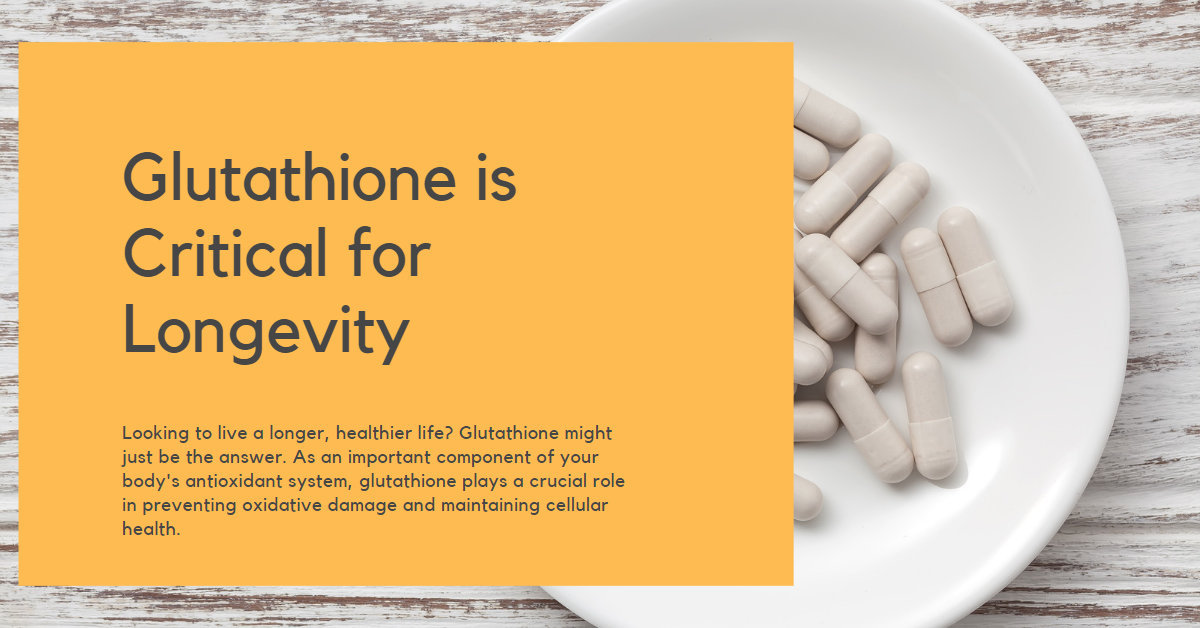Glutathione is important for your antioxidant system that plays a crucial role in maintaining cellular health and preventing oxidative damage. Oxidative damage is a key driver of aging, and therefore, the role of glutathione in longevity has been extensively studied.
Several studies have suggested that glutathione levels decline with age and that this decline is associated with an increased risk of age-related decline. In addition, several studies have shown that boosting glutathione levels through supplementation or other interventions can improve longevity.
For example, a study published in the Journal of Nutrition found that supplementation with N-acetylcysteine (a precursor to glutathione) eliminated negative effects of oxidative stress, even when they were exposed to high levels of oxidative stress. Another study published in the Journal of the American Geriatrics Society found that higher glutathione levels were associated with maintaining physical function with aiding.
Moreover, a review published in the journal Aging Cell suggested that maintaining optimal levels of glutathione could help delay the aging process. The review also noted that several interventions, such as caloric restriction, exercise, and supplementation to increase glutathione, improve longevity.
In conclusion, glutathione is critical for longevity due to its role in preventing oxidative damage, and maintaining cellular health. Several studies have shown that boosting glutathione levels through supplementation or other interventions can improve longevity.
References
- Richie JP Jr, Leutzinger Y, Parthasarathy S, Malloy V, Orentreich N, Zimmerman JA. Methionine restriction increases blood glutathione and longevity in F344 rats. FASEB J. 1994 Dec;8(15):1302-7. doi: 10.1096/fasebj.8.15.8001745. PMID: 8001745.
- Schipper HM. Glutathione synthesis and its role in aging and disease. Ann N Y Acad Sci. 1998 Nov 20;854:27-42. doi: 10.1111/j.1749-6632.1998.
tb09845.x. PMID: 9928374. - Stadtman ER. Protein oxidation and aging. Free Radic Res. 2006 Jul;40(7):1250-8. doi: 10.1080/10715760600822239. PMID: 17015261.
- Schafer FQ, Buettner GR. Redox environment of the cell as viewed through the redox state of the glutathione disulfide/glutathione couple. Free Radic Biol Med. 2001 May 15;30(11):1191-212. doi: 10.1016/s0891-5849(01)00480-4. PMID: 11368918.
- Hagen TM, Wierzbicka GT, Bowman BB, et al. Fate of dietary glutathione: disposition in the gastrointestinal tract. Am J Physiol. 1990;259(4 Pt 1):G530-G535. doi:10.1152/ajpgi.1990.259.4.
G530 - Lang CA, Mills BJ, Mastropaolo W, Liu MC. Blood glutathione decreases in chronic diseases. J Lab Clin Med. 2000 Oct;136(4):270-6. doi: 10.1067/mlc.2000.109
